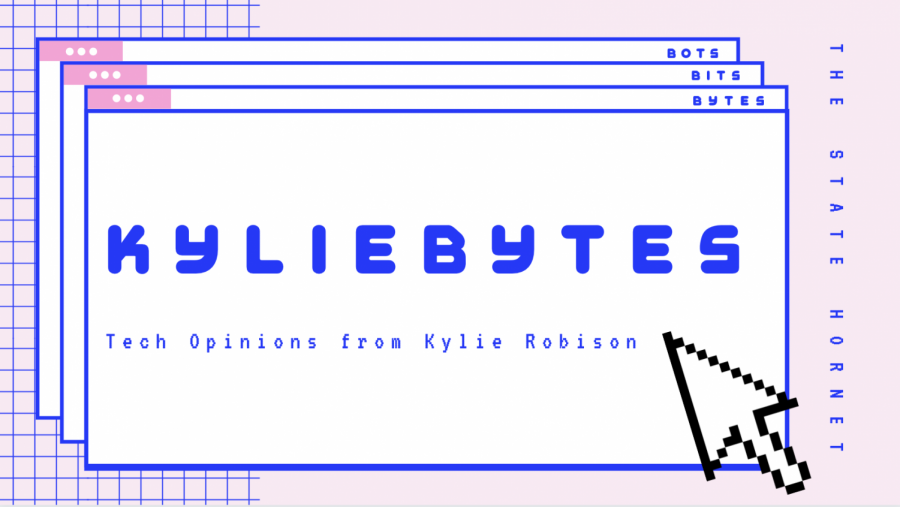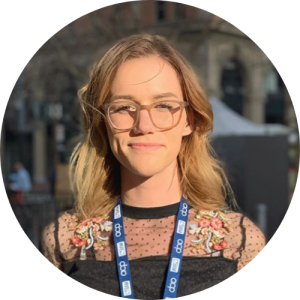KYLIEBYTES: ‘Goodbyte’ to my year in college journalism
Saying my goodbyes to the best student publication around
December 15, 2020
I think I might have chosen the best year to dive into journalism. I’ve been lucky enough to cover a presidential election, a deadly pandemic and how my peers handled it all. I would have never guessed this is where I would have landed at the end of 2020, but I’m eternally grateful for this publication for bringing me to where I am today.
My partner asked me recently, “When did you know you wanted to be a writer?” It’s a question I’ve never been asked. The first time I ever wrote was when my grandpa and I exchanged letters. My grandparents raised me for the first five years of my life, and upon age five I was moved to my mom’s home, away from the only parental figures I had ever known. I sent my grandparents a letter every day, and they returned them, for years. So, the first day I ever loved writing was when I was five.
Once I was ten, my grandpa opened my first email account. That way, we could save some postage. That was the day I realized technology is really something to behold. It opened up a whole new set of doors for me, and in turn, pushed me to continue writing.
I journaled every day about my life, about what I was going through and more. Soon, that physical journaling led to a website called Tumblr. My URL was aptly named “preteenager” and I surmised 20,000 followers simply from blogging about my life. It was exhilarating, and I realized this might be a career worth following.
I ended up applying to community college on a whim. I stumbled my way through my freshman year as a first-generation student. I originally started as an early childhood education major so I could teach coding classes to underrepresented youth, but I quickly changed to business when I realized I had no idea what I was doing.
I made my way to Sacramento State in the fall of 2019 to study business management information systems. I was absolutely enthralled by the campus life, and the opportunities this university provided. After barely surviving my first semester with mostly A’s and B’s, I signed up for my next semester. Over that winter break, I decided to look into writing opportunities to truly pursue my passions with a career interest in technology journalism.
That’s when I found The State Hornet.
I noticed my own school’s publication lacked any and all technology reporting. I thought to myself, how could that be? So I emailed an application to cover technology for the student-run publication.

I quickly found out that there is no application. Simply, you have to sign up for the class in order to write. I almost gave up right then — there was no way I could change the next year of my life, compromise my entire schedule, to write for The State Hornet.
Spoiler: That is exactly what I did.
In the second week of school, I changed my entire class schedule. I took a 7 a.m. required finance class just so I could fit The State Hornet into my schedule, and adding The State Hornet meant I was taking 18 units.
Everyone attempted to dissuade me. I was the president of a club, working part-time and now I wanted to be a technology reporter with 18 units of coursework? It was surely going to be a disaster.
However, it was quite the opposite. I was surrounded by truly brilliant reporters, who breathed life into stories to the likes I’ve never seen before. Margherita Beale, our former editor-in-chief, was larger than life. She commanded the newsroom, all while encouraging us to be the best reporters we could be. She sat with me at the opinion section table, where the opinion editor Shiavon Chatman ran our show.
Shiavon and Margherita are what make authentic journalism worth doing. “Shiavon’s Jawn” was positively brilliant, calling upon some of the strongest topics, and deciphering them with ease. Margherita, in all of her elegance, brought real power to the table. I enjoyed every second that I was able to bask in their glow.
RELATED: SHIAVON’S JAWN: I was raised by a village that didn’t talk about feelings
A quarter way through the semester, I was chosen to go to San Francisco for the Associated College Press conference with a handful of our editors, including Margherita. Quite literally, The State Hornet gave me a front-row seat to meet some larger-than-life editors and writers at the country’s most influential publications. I got to meet Biz Carson at Protocol and Michael Calore at Wired, and watch the founder of Mother Jones speak on the reality of journalism. Our State Hornet team even got matching T-shirts that said, “Journalism matters, now more than ever.”
The truth is, that entire conference I was hanging on by a thread. News had broken that week that COVID-19 threatened to take over the United States, and legislators were urging emergency mandates. Margherita and I bonded on the streets of San Francisco, anxiously smoking cigarettes, chatting about why we loved journalism and where we saw ourselves in five years. It was the only thing that put my mind at peace.
During that conference, Margherita and I attended a forum with a journalist from NPR. The journalist stood up and told the room, “If you don’t get a journalism master’s from an Ivy League university, you will never work at a major publication.” I looked at Margherita, who was deflated. We smoked two cigarettes after that and continued to gush about our passions anyway.
Shortly after that conference, our school shut down, then our state, and finally, our country. We finished out our semester reporting on this new reality. As a technology reporter, I was covering the transition to online learning, whether your smartphones are spreading the coronavirus and the complications of Zoom school. It wasn’t exactly how I expected to end my first semester as a fully-fledged technology reporter, but nothing went quite as expected in 2020 anyway.
So, this semester marks nearly a full year with The State Hornet. Here’s what I’ve learned:
- There is no Oxford comma in AP style. This erasure hurts deeply, but so is life.
- Attribution. Attribution. Attribution.
- Don’t be afraid to ask big-time journalists to critique your work. Journalists are mostly friendly humans, and you will have made an important friend in doing so.
- Always keep learning, reading and absorbing the news — especially what’s related to your beat.
- Remember to thank your editors for their hard work.
- Don’t be afraid to chase big stories — you never know where they’ll take you.
- Rest is necessary. You might drop dead without it, so take a break when you can.
- Last but not least, don’t let anyone gate keep you from the industry. Don’t let them crush your passion. You can do this.
The State Hornet allowed me to chase childhood dreams in a way that I couldn’t wish for. I gained newsroom experience, learned from a team of inspiring journalists and was advised by the amazing Stu VanAirsdale, who even revised my entire resume so I could have a shot at the journalism job market.
I wish I never had to leave this newsroom, but I know I’ll continue a path toward great things, and The State Hornet will continue to have its finger on the pulse. I’m excited to see where we all land after the pandemic. I have no doubt in my mind that everyone at The State Hornet is lined up for great things.
I will be continuing KYLIEBYTES on my own through Substack, to which you can subscribe here. This is my final “goodbytes” from KYLIEBYTES at The State Hornet. Thank you for everything and last but not least, Stingers Up!
Margherita Beale is now an assistant editor at Forbes, after less than a year on the job market. Shiavon Chatman has released a book with Shea Serrano’s Halfway Books, that you can order here.




































































































































